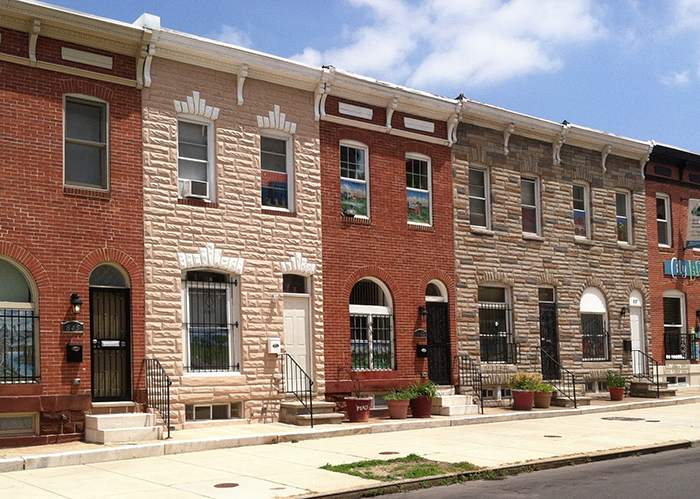
May 18, 2017
By Christina Selby
Dr. Meredith Greif received an award from the 21st Century Cities Initiative’s inaugural seed grants to collaborate with Project PLASE, an organization in Baltimore City that provides housing for stigmatized homeless individuals, on a project entitled How Landlords House the Homeless. Project PLASE is one of many organizations in Baltimore and across the country that provides housing through the Department of Housing and Urban Development (HUD) program, Shelter Plus Care, which is now part of the Continuum of Care programs. This program is important because it connects homeless individuals with physical or mental disabilities to private market housing and pays either a portion or the entirety of their rent. The program also pairs each participant with a case manager, who checks up on them, connects them with any support they need, and ensures they are taking care of themselves and their unit. According to the HUD, the stock of Shelter Plus Care housing in Baltimore City primarily shelters those with chronic substance abuse issues and those who are severely mentally ill. These individuals are traditionally discriminated against in the private market and have a particularly hard time finding housing. They also are more likely to be low-income. Thus, this particular Continuum of Care program is helping tackle problems of homelessness and housing insecurity for many vulnerable populations.
Landlords who owned more properties, had perceived greater financial security, and were satisfied with case management reported that they were more likely to continue with the program and invest further in it.
helter Plus Care has been around for several decades, but most research on subsidized housing has focused on Section 8, a larger program implemented in the 1970s that subsidizes housing for lower income residents. In addition, other research has centered on the experiences of tenants in these programs. Thus, this research project provides a unique perspective, in that it focuses primarily on the experiences of the private market landlords who provide the housing in this understudied program, as opposed to program participants (tenants). Dr. Greif has recognized that these landlords play an essential role in this government program and without them the program would not be sustainable. They are the ones actually providing the housing and thus it is essential to understand their perspectives and practices, including why they choose to participate in the program, the quality and location of housing they are providing, and how they interact with their tenants. I have had the amazing opportunity to be her research assistant and conduct the research alongside her. We uncovered that landlords varied greatly in their approach to housing their formerly homeless tenants. Many expressed good intentions to provide decent housing, but some were more likely than others to provide housing in safe, resource-rich neighborhoods. Further, landlords who owned more properties, had perceived greater financial security, and were satisfied with case management reported that they were more likely to continue with the program and invest further in it. These findings have implications for how to recruit and maintain landlords who provide stable, supportive housing to some of Baltimore’s most vulnerable residents.
The research process consists of in-depth interviews, in which we ask landlords who provide supportive housing about a wide variety of topics through open-ended questions. These questions range in topic, from their background and how they first became landlords, to their actual business practices and views of the Shelter Plus Care program, and their future plans for working with it. We meet these landlords where it is most convenient for them, whether it be in their homes, properties, or a coffee shop they frequent. They have given us significant insight into the world of Shelter Plus Care – both the great parts of the program and areas for improvements. We learned what attracts landlords to this program in the first place, what kind of housing they are providing their tenants, and how they handle any problems or concerns. Information gleaned from our analysis of this data will culminate in a paper and report on recommendations about how to best deliver stable, supportive housing for Baltimore residents who have been homeless and face serious obstacles to housing security.
In the fall of 2015, I took Dr. Greif’s class, Housing and Homelessness in the United States. I entered the class with an interest in housing policy and left with a vast knowledge of housing programs, problems facing the homeless, and innovations taking place across the country to meet housing needs. This class sparked a desire for me to learn even more and stay engaged in housing issues. Thus, it was a perfect fit when Dr. Greif mentioned that she was starting this project. This research has shown me what a housing program really looks like on the ground and how these policies rely on the private sector. More generally, I have developed a confidence in myself and a genuine interest in social policy research. I had never really considered doing research myself, but working on this project has shown me that research is really exciting, allows you to meet a lot of interesting people, and uncover the experiences of a whole group. It also has been a great experience for me to work in and around Baltimore. I have really gotten to know and understand the city in a new way by traveling to different neighborhoods and speaking to landlords who are often city residents themselves.
Overall, this research will contribute to the growing dialogue on how best to improve our nation’s housing programs and ensure that housing remains available, affordable, and beneficial for vulnerable tenants, especially in Baltimore City.
Christina Selby is a junior at Johns Hopkins University majoring in Sociology and Political Science.

